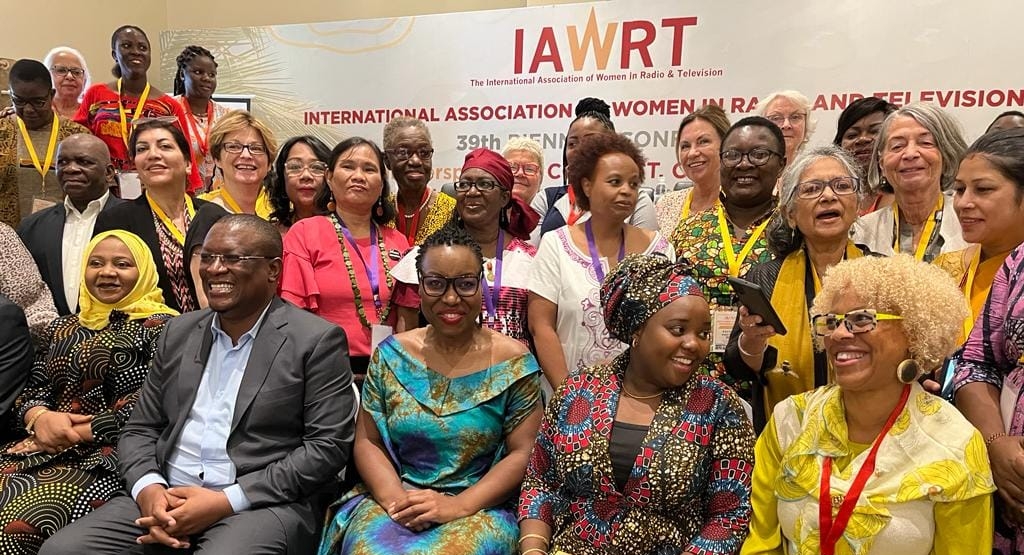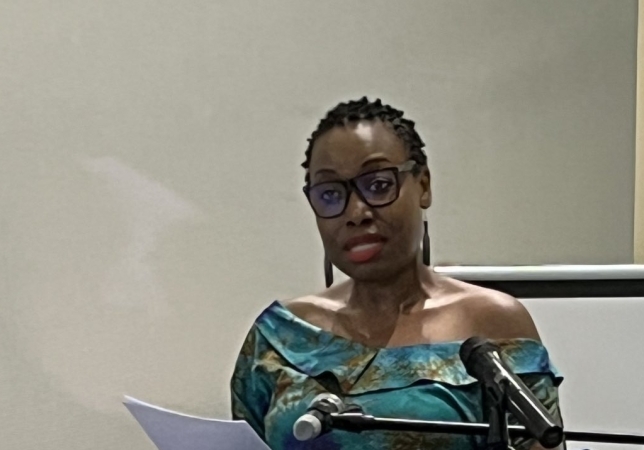IAWRT 39TH BIENNIAL CONFERENCE: CONFLICT, COVID AND CLIMATE CHANGE
BY VIOLET GONDA, PRESIDENT, IAWRT
- Your Excellency, President of the Republic of Tanzania – Honorable Samia Hassan Suluhu,
- Minister of Information, Communication and Information Technology, Tanzania – Honorable Nape Moses Nnauye,
- Minister of Information, Youth, Culture and Sports, Zanzibar – HonorableTabia Maulid Mwita,
- Chapter Head of IAWRT Tanzania – Fatuma Matulanga
- Incoming IAWRT President Dr. Michelle Ferrier
- Representatives of International Bodies,
- Members of the International Association of Women in Radio and Television (IAWRT) here in Tanzania and watching virtually from all over the world, a pleasant morning!
It gives me great pleasure to welcome you all to the opening of IAWRT’s 39th Biennial Conference in Zanzibar, Tanzania. Indeed, a beautiful country.
It is my honour to be here on behalf of IAWRT, together with reputable champions of gender equality and social justice and our partners from the Tanzania Media Women’s Association (TAMWA).
IAWRT dates back to 1951 and is the oldest global organization for women in media. We are a non-government organization in consultative status with the United Nations Economic and Social Council or ECOSOC. I am glad to report that we have more than 400 members in 55 countries across the globe.
Over the years, IAWRT has been responsible for commissioning ground-breaking documentaries; organizing safety training for women journalists; hosting film festivals and setting up and supporting community radio stations.
Our Biennial has always been an occasion to meet, greet, strategise and strengthen this amazing network of women who believe in the power and potential of IAWRT to be a catalyst of change. A venue where the aspirations of women in media can be realized.
The conference this year focuses on how the interlinked global crises of COVID-19, Conflict and Climate Change are impacting women. Building a body of action-oriented knowledge around these urgent areas will be at the core of this event where senior women journalists, researchers, activists and filmmakers from all continents will share experiences and chart the way forward.
Gender inequality, coupled with the climate crisis, is regarded as one of the greatest challenges of our time. Climate change drives migration and conflict across the world, making women vulnerable to all forms of gender-based violence – child marriage, human trafficking, and sexual violence.
We hope to capacitate and enrich women journalists to be able to perform the critical function of providing more environmental coverage so that governments, civil society, and corporations assume responsibility and take action.
As truth-seekers, journalists are particularly vulnerable in conflicts – and women journalists even more so. Last year, IAWRT took a gargantuan step by creating a Digital Safe House (DSH) for women journalists in the Philippines, a program that is to be expanded to other countries, including Afghanistan and the Eastern European Partnership.
While the COVID-19 pandemic itself has hit women disproportionately hard, in many countries the pandemic has also been used as a tool to target and impede women journalists.
In this scenario, IAWRT is proud to be championing a series of innovative programs. To name a few:
- My Climate Change Story project – which offers training for journalists and rural women in using cell phones to produce climate change stories that push for change
- Continuous monitoring of progress towards gender equality and social justice in and through media by means of research and training projects.
- Media Monitoring Project, which involved IAWRT members in the evaluation of public radio and public television programming (560 hours of broadcasting) by 8 chapters (South Africa, Kenya, Tanzania, Cambodia, India, Moldova, Poland, and USA).
- Capacity-building training conducted in 8 countries on 4 continents to assess media programming and to collect, analyze, and interpret evidence about women’s participation and portrayal in the media; a practical, hands-on training project was likewise implemented.
- The Safety Handbook for Women Journalists, which was supported by UNESCO, and has now been translated into several languages. It fulfills a dire need for advice and recommendations on security and safety, especially for women journalists working in war and conflict zones.
Indeed IAWRT has done a lot to reinforce the participation of women in the media and we commend all of you for being part of this network or for supporting us!
I take this opportunity to thank our Biennial Committee – Bibiana Piene, Archana Kapoor, Sarah Nakibuuka who have worked tirelessly and burnt the midnight oil to make this a memorable event. I would like to thank our host Chapter, IAWRT Tanzania, led by Fatuma Matulanga, Razia Mwawanga, Mama Rose Haji Mwalimu without whose efforts we would not be here. I would especially like to thank the production crew, led by technical director Jola Diones-Mamangun, who have connected us with our members and supporters across the globe and are giving this conference visibility beyond borders.

Without our supporters and funders, the people who believe in us and endorse the values we stand for, we would certainly not have been here. I take this opportunity to thank
- The Oslo Metropolitan University’s Journalism and Media International Centre (JMIC),
- The International Media Support (IMS),
- The Institute of Commonwealth Studies’s School of Advanced Study University of London,
- The Norwegian Union Journalist (NUJ),
- The UN Women, and
- SMART – Seeking Modern Applications for Real Transform – SMART
and all the local supporters of this event like:
- the Zanzibar Broadcasting Corporation
On behalf of the 2020-2022 IAWRT Board, KARIBU – welcome everyone to the 39thIAWRT Biennial Conference! We look forward to listening to and learning from each other over the coming days!
I would now like to welcome our first speaker Minister of Information, Youth, Culture and Sports, Zanzibar – HonorableTabia Maulid Mwita. We appreciate the strong support and representation from the Tanzanian government. We see this as an endorsement of all that IAWRT Stands for – press freedom and fair and equal space for women in media.
Violet Gonda
OUTGOING IAWRT PRESIDENT (2020-2022)








